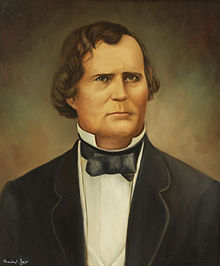Madison S. Perry
Madison Starke Perry ( 1814 in Lancaster County , South Carolina , † March 1, 1865 in Rochelle , Florida ) was an American politician and from 1857 to 1861 the 4th Governor of Florida.
Early years and political advancement
Madison Perry was born in South Carolina in 1814. He attended Franklin Academy in Lancaster before moving to Florida in 1845. There he soon became an important plantation owner, whose interests he also represented in public. Because of his talent for rhetoric and his commitment to the planters, he was elected to the Florida House of Representatives in 1849 and to the State Senate a year later . His political rise continued with his election as governor of Florida in 1857.
Florida governor
His four-year term began on October 5, 1857 and ended on October 7, 1861. He was the last governor before Florida and the first governor during the Civil War . In the pre-war era, the country's rail network was expanded, several new counties were established, and a protracted border dispute with Georgia was settled. Perry saw the possibility of an impending war as early as 1858. For this reason, the militia, which had since been deactivated, was brought back to life. Influenced by the national events in the United States on the eve of the Civil War, namely the election of Abraham Lincoln as US President in November 1860 and the withdrawal of South Carolina from the Union a month later, Florida also made a decision under Perry's leadership on January 11, 1861 to leave the Union, which the state had only joined on March 3, 1845. In the final months of his tenure, Florida joined the Confederate States and Perry supported their war effort. This included the placement of soldiers for the army and the delivery of food and other supplies.
Further life
After the end of his tenure in October 1861, Perry retired from politics. In 1862 he became colonel in a Florida Volunteer Regiment. He remained in this position until April 30, 1863, when he submitted his departure because of health problems. He died two years later in March 1865 in his hometown of Rochelle. He was married to Martha Peay Starke, with whom he had two children.
literature
- Robert Sobel and John Raimo (Eds.): Biographical Directory of the Governors of the United States, 1789–1978. Volume 1, Meckler Books, Westport, 1978. 4 volumes.
Web links
- Madison Perry at the National Governors Association (English)
- Madison S. Perry in the database of Find a Grave (English)
- Florida Governors' Portraits
| personal data | |
|---|---|
| SURNAME | Perry, Madison |
| ALTERNATIVE NAMES | Perry, Madison Starke (full name) |
| BRIEF DESCRIPTION | American politician |
| DATE OF BIRTH | 1814 |
| PLACE OF BIRTH | Lancaster County , South Carolina |
| DATE OF DEATH | March 1, 1865 |
| Place of death | Rochelle , Florida |

